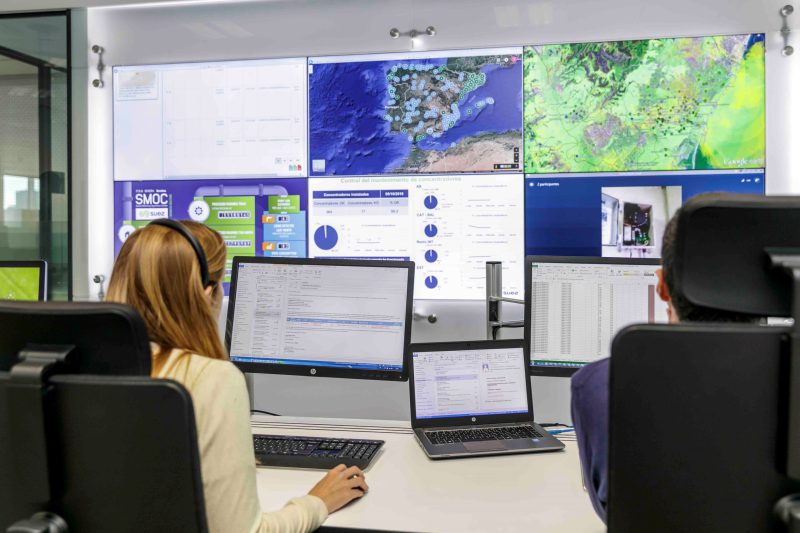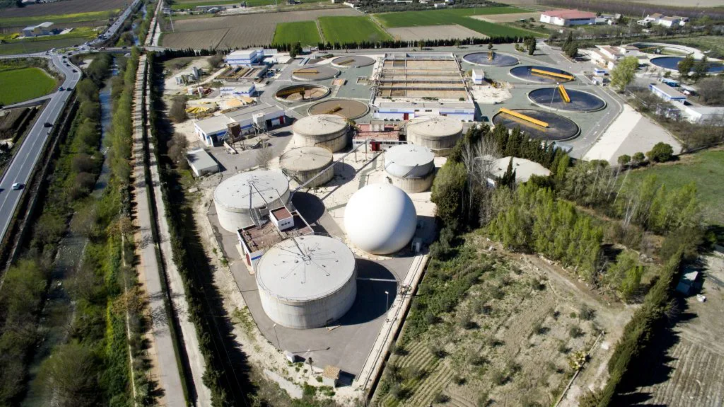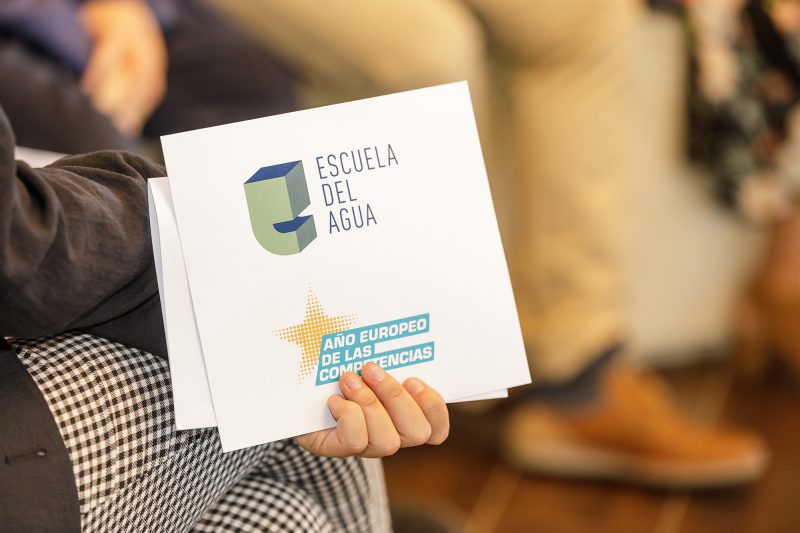

The Online Master in Water Technology and Management is a program consisting of 60 ECTS credits (1500 hours of dedication) distributed in:

Technical water management:
with a duration of 36 ECTS credits (900 hours).

Strategic management of water companies:
with a duration of 18 ECTS credits (450 hours).

Final project:
which integrates the contents covered throughout the program. The estimated time dedicated by the participant to the final project is 6 ECTS credits (150 hours).
We develop the water cycle, with special attention to the urban water cycle and its management. All the stages that make up this cycle and the different characteristics of both water and the infrastructures involved are detailed. It also provides the most appropriate management tools for each of these stages. Always, under the holistic vision of the entire water cycle and, therefore, of the interrelationships between each of the stages and their implication in a sustainable management of the resource within the cycle itself.
This credit introduces students to the water resources available and identifies the characteristics of each one according to its origin. Then, the different methods of exploitation of each one of them are specified, ensuring sustainability by taking care of both the quality and quantity of these resources. Alternative resources are also presented, with their advantages and disadvantages, in order to include them in the overall management of water resources.
Presentation of the regulatory framework by which water resources are legislated. The characteristics of the regulation that guarantee the rational and sustainable use of water, as well as its accessibility for all, will be discussed. The tools for the design of management models aimed at achieving these objectives will also be presented.
The contents applied in the integrated management of water resources, to detect all those agents and actors involved, the interrelationships between them and their consequences in the hydrological planning. The criteria for the participation of all these agents will be taken into account to ensure a basin management that responds to all the needs or demands detected.
This credit reviews the key concepts to understand the principles of nature-based solutions (NBS) and green infrastructures (GI), as well as the global strategies adopted at the international level and the current regulations at the European level that enhance their implementation. The main nature-based solutions in the water cycle, the benefits they bring and examples of their application are reviewed. Finally, you will learn the key aspects to take into account for the implementation or management of this type of infrastructure.
The essential knowledge to understand sustainable development and detect impacts related to water resources. The technologies and solutions that ensure sustainable management of these water resources are described, focusing on water footprint calculations as indicators of the sustainability of the different professional activities, as well as the presentation of measures that will steer the different processes towards sustainability.
This credit brings together two fundamental vectors for the achievement of the Sustainable Development Goals (SDGs) and the 2030 Agenda: the involvement of the private sector and water as a lever for innovation. It presents both the contextual elements to understand the relevance of the 2030 Agenda for the water sector and a set of good practices in the format of case studies for the various challenges announced, in order to design a strategy to contribute to the SDGs applicable from your responsibilities within a water management company.
The necessary knowledge related to energy, its consumption and management in the facilities of the integral water cycle. The contents to carry out an energy audit will be presented, as well as the necessary tools to carry out the diagnosis of energy consumption in these facilities and to propose solutions and improvement measures, as well as the preparation of the energy audit report.
This credit develops the rules and guidelines necessary for the implementation of a safety and health culture in the professional activity to be developed. In addition, different tools are made available to the student to not only ensure good health and safety management, but also to guarantee leadership skills in this area.
All physical, chemical and microbiological parameters that can influence water quality are presented. The most common contaminants, possible diseases and the sampling plan necessary to guarantee the quality of water for human consumption according to current legislation.
A complete knowledge of groundwater management and groundwater abstraction within the existing hydrogeological context. It analyzes the use of groundwater by means of vertical wells, from the initial phase of the location of the catchment, through the constructive design, and finally the development of one of the most common techniques for the protection of this type of catchments: the establishment of perimeters.
All the knowledge necessary to size a drinking water treatment plant, from the design of the catchment to the functional definition of all the treatment stages to which the water will be subjected in order to meet the desired quality parameters.
In this credit, membrane treatments, their purpose and operation are explained. The different types of membranes, their classification, their layout scheme and design parameters are presented in order to be able to simulate a treatment system using software.
To know how a drinking water treatment plant operates through the different practices for each unitary process, the parameters that need to be controlled in the process and how these operations affect water quality at the end of them. Likewise, different anomalous situations that can be found in the usual operation are identified and developed, and guidelines are defined to be able to continue with the operation in these cases.
A method to facilitate decision making in water treatment plant management. Criteria for personnel management, process optimization, automation requirements, as well as activity control parameters, management systems and cost elimination are presented.
It focuses on aquifers and the basics of hydrological and hydrogeological management and planning, in order to present the joint, coordinated and integrated use of surface and groundwater resources, both at the public and private operator level.
Methodologies and techniques for the design of a supply network according to the conditions to which it will be exposed and according to the existing operation forecast, with an evaluation of the effects that both extensions and modifications will entail. The design and service regulations governing drinking water distribution networks will be presented. Finally, the necessary knowledge on which materials to use in these networks will be provided.
The physical parameters that describe the hydraulic behavior of supply networks are explained and the necessary knowledge to understand the operation of the main components of these networks is provided. Next, the minimum mathematical tools for network sizing are provided, and the most commonly used software for the design of new elements is also explained.
Knowledge will be acquired to achieve the best provision, operation and maintenance of the supply service and the relationship with the subscriber. The tools to identify and optimize the elements that determine the proper functioning of the network are also presented, and energy and hydraulic efficiency and energy savings in a drinking water distribution network are studied.
In this credit the knowledge related to asset management in a distribution network is presented, and the student is trained to discriminate the information involved in the decision making involved in this management. Concepts on the reliability of infrastructures, useful in the evaluation of their deterioration, are explained. Next, tools will be provided to enable students to design an optimal strategy for the maintenance, operation and renewal of assets. Finally, innovative solutions and technologies applicable to supply network asset management will be presented.
An overview of the efficiency of the supply network, followed by an in-depth study of the concepts involved, paying special attention to non-revenue water. It also describes the calculations of efficiency control ratios, which make it possible to diagnose the state of the network in terms of efficiency. The tools for designing the optimization plan for non-revenue water in the distribution system are also provided.
We address the characterization of the supply system, in order to subsequently identify the hazards identified and, from there, to be able to assess the health risk they pose. Students will be provided with the necessary knowledge to draw up a health risk prevention plan, and will also learn how to verify a prevention plan. Finally, they will also acquire the necessary skills to manage these plans using the ISO 22000 standard.
This credit aims to provide open and innovative knowledge on existing technologies and their applicability to supply networks. It analyzes the trends and knowledge of R+D+i applicable to the management of network infrastructures. In addition, it shows all those fields where improvements are possible with the increase of efficiencies and the improvement of processes through the implementation of technologies that may or may not be directly devised for drinking water distribution networks.
Methodologies and techniques for the design of a new drainage network or for the extension or modernization of an existing drainage network. Urban drainage planning will be presented, followed by an in-depth study of hydraulic and hydrological concepts, the essential elements of a drainage network and, finally, the fundamental design criteria. Modeling, sustainable urban drainage techniques (TEDUS) and the principles of advanced management will also be presented.
Presentation of the elements of the drainage network and provision of the necessary knowledge for its design. The starting data essential to define the needs of the network to be designed are analyzed and the tools that allow its hydraulic and mechanical design are provided. Then, the implementation of the network and its construction process are studied in depth, to finally present all the documents that must be included in a drainage network project.
All aspects of the network operation that generate the need for cleaning. The means, criteria, techniques and instrumentation necessary for the correct cleaning of the network are presented. Then, the evaluation of cleaning is discussed in depth, followed by the advanced cleaning of the network, its pillars and processes, up to the description of the measures that provide a sustainable cleaning.
Different topics related to the aging of the network are dealt with, in order to influence the necessary knowledge for its minimization. It begins with the presentation of the different inspections of the network, to move on to the pathologies that lead to the aging of the different elements that compose it. Subsequently, rehabilitation methods are explained, both conventional and trenchless methods. The rehabilitation of the characteristic elements is also discussed, to conclude with the decision making process, the conditioning factors and the applicable regulations.
It deals with the knowledge related to the operation and maintenance of the drainage network, both in dry and rainy weather. The organization of the network operation service is explained, the concepts of basic operation and advanced operation are developed, and the remote control systems and centralized operation systems are discussed in depth.
An overview of the control of discharges to the sewage network, followed by a description of the discharge control plan, from design to implementation. It also describes the intelligent discharge control systems and the analysis of the costs directly or indirectly related to this discharge control.
Introduction to wastewater treatment starting from its historical evolution and legal framework. The objectives of wastewater treatment are then defined, the characteristics of wastewater and the parameters for defining the flow to be treated are analyzed and finally the main wastewater treatment processes are described, providing the necessary knowledge for their selection.
Methodologies and techniques for the sizing of all the processes that make up the water treatment line of a wastewater treatment plant. The parameters that influence the design of each one of the processes will be discussed, from pretreatment and primary and secondary treatment, going in depth into the processes with biofilm, to disinfection. Natural treatment systems will also be presented.
Methodologies and techniques for the sizing of all the processes that make up the sludge treatment line of a wastewater treatment plant, indicating the necessary guidelines to identify when it is advisable to anaerobically digest the sludge, as well as the techniques to size the gas line when anaerobically digesting the WWTP sludge. Additionally, the credit provides the necessary knowledge to quantify the energy recovery by obtaining electrical energy from the calorific value of the biogas produced in the anaerobic digestion. Finally, it also provides guidelines for sizing the deodorization process to avoid the appearance of unbreathable atmospheres in the WWTP.
Knowledge about the normal operation of a wastewater treatment plant, highlighting the most important aspects involved in the operation. The parameters and elements to be controlled will be exposed, as well as the criteria used in each case. Specifically, the credit focuses on personnel management, control of each process of a WWTP, emission control, equipment regulation criteria, the consumption of a wastewater treatment plant (energy and reagents) and, finally, cost control.
We address the different issues of plant operation under abnormal or extraordinary conditions. We start with the definition of the extraordinary conditions in a wastewater treatment plant, to derive in the usual problems that the sewage network can suffer: uncontrolled discharges, hydraulic overload in episodes of high rainfall and infiltrations, as well as odor problems or bulking and foaming problems in the biological process, limitation of the treatment capacity or equipment breakdowns. Subsequently, problems related to dry weather discharges, internal drainage management and operational problems in the anaerobic digestion and gas line are explained.
Knowledge related to asset management in a purification facility, what it is used for and what tools can be used. Management methodologies are explained, as well as how to elaborate an inventory of electrical and mechanical assets and how to carry out a correct revision of the installations. Finally, the concepts of preventive and predictive maintenance are developed.
The topics related to the regeneration of water from a wastewater treatment plant are discussed. The different regeneration mechanisms are explained, as well as the criteria to select the most appropriate technologies, according to the final uses of the water. The most important operating parameters of the process are explained, as well as the criteria to define an appropriate analytical plan for quality control of the treatment and output water.
The concept of globalization and its implications for today's economies. The main actors of the global economy are reviewed and special emphasis is placed on the financial economy and its current importance in relation to industry, trade, etc. Particular cases of countries that have seen their economies altered in the context of globalization are studied.
Techniques for the analysis of organizations from an internal and external point of view are presented, in which the general and specific environment are distinguished, basing a large part of the analysis around the idea of competition and its causes and reasons. The different strategic analysis matrices are particularly discussed.
Analysis of the different elements of strategic management. The components of the strategic framework of companies are defined (mission, vision, values, etc.). Strategic proposals based on the concepts related to competition according to the paradigm defined by Porte and the different types of alliances and modes of cooperation between organizations are studied.
What are the most relevant aspects of innovation in organizations. The methodologies for establishing objectives in this area and the scope of their application are explained. It also gives an extensive treatment to open innovation, distinguishing it from traditional innovation.
Different tools are proposed for the development and subsequent evaluation of innovation projects according to the objectives sought and the characteristics of the organization and the scope of application of the results after identifying the most appropriate innovation model.
The first of the elements that make up the annual accounts of companies, the balance sheet, is addressed. The analysis of the balance sheet provides a clear diagnosis of the company's equity (indebtedness and capitalization) and financial situation (liquidity and long-term solvency); therefore, the balance sheet provides information on the financial soundness of a company and guarantees to third parties.
The second component, not hierarchically but sequentially, of the annual accounts is analyzed, namely the profit and loss account, which determines the company's results for the year and, therefore, becomes a fundamental element of analysis to know the company's past evolution, its trend and, to a certain extent, its future evolution.
The income statement is the reflection of the company's performance, as it compares the income obtained with the expenses generated in the period to obtain such income. The third element will also be analyzed, the cash flow statement, which shows the company's operations on the basis of its cash flow, as well as the transactions arising from its investment and financing activity. Its analysis will allow us to see the company's cash movements in a given year.
The main tools available to the head of a company's financial area to analyze projects and assess their viability based on criteria such as: profitability, payback period, added value, etc. are presented. To better understand the subject of risk, we must first understand what is meant by risk and risk aversion.
Other methods will also be analyzed that aim to delimit the risk itself, regardless of the cost of the company's resources. These are the NPV expectation-variance analysis method and the Monte Carlo simulation.
One of the main tasks faced by the company and, specifically, its financial manager, is to know the financial needs and which are the most suitable sources to cover them.
To this end, we first analyze the financial dynamics of the company and, secondly, we analyze the different sources of financing available to companies, in order to learn about their most important characteristics and, thus, provide them with the most appropriate allocation.
Project management based on the PMBOK methodology will be explained from the management point of view and considering its critical aspects, such as scope, planning, risk identification and follow-up, among others.
Identification and analysis of the basic procedures in people and talent management: selection, training and remuneration systems. In addition, the principles of knowledge management in organizations are studied and its main tools are analyzed.
On the one hand, we study the management of people in organizations and their role in the different organizational models, identifying at the same time their needs and skills based on competencies. On the other hand, the bases of change management and its different aspects are studied.
Project management based on the PMBOK methodology will be explained from the management point of view and considering its critical aspects, such as scope, planning, risk identification and follow-up, among others.
We study the concept of quality, the main systems for its management and the importance it has in the management of organizations as a catalyst for change and updating.
From a practical approach, the knowledge acquired in the four previous sections is worked on as a synthesis so that the student is able to draw conclusions from a set of diverse information of an economic nature.
The bases of the commercial management of a water service are the attraction and treatment of customers, transparency in management and the ability to respond to customer expectations without neglecting the business vision.
The keys for the development of an adequate quality of service and attention to customers, based on the premise that they are the key element for any company, since its existence depends on them.
It shows the increasingly complex management of water. Environmental regulations are, unsurprisingly, increasingly demanding, and the impacts of climate change require both mitigation and adaptation measures. Companies that provide water services, whether public or private, face a major challenge: to reduce water consumption, offer a quality service, and maintain and improve ecosystems.
Students are provided with the contents to learn how to plan and execute industrial marketing actions aimed at their target audiences, as well as to develop an adequate corporate social responsibility policy.
If you are interested in the program, we invite you to enter the training environment of the Water School.
You will receive the access codes and you will be able to see first-hand what the environment is like, see samples of the innovative teaching materials and contact your academic advisor, who will guide you and answer any questions you may have.
Contact us at +34 932 479 735, write us a WhatsApp to +34 616 778 523 or leave us your details in the contact form and we will contact you shortly.

The teaching team of the Online Master in Water Technology and Management is formed by UPC faculty and specialist professionals from Agbar and the sector.The course is designed to ensure the practicality and functional applicability of the contents covered.
To guarantee your success in the learning process from start to finish:


Degree in Business Administration and Management from the University of Barcelona (2001), Postgraduate in University Teaching of Science, Technology and Mathematics from the Polytechnic University of Catalonia (2020). PhD in Business from the University of Barcelona (2013)..
Lecturer in the Department of Business Organization at the Polytechnic University of Catalonia and coordinator of the TechTalent-Lab for talent management. Co-director of the Master in Water Technology and Management. Certified LEGO® SERIOUS PLAY® and Kanban Management Professional Facilitator.
October 2024
24 months - 1500 hours
60 ECTS
Spanish
7.200€
Online
Those who successfully complete the program and meet the necessary academic requirements will be awarded a Master's degree in Water Technology and Management issued by the Polytechnic University of Catalonia. In order to obtain the master's degree it is necessary to have an official university degree or a university degree equivalent to a bachelor's degree, diploma or degree. Otherwise, you will obtain a certificate of completion issued by the Fundació Politècnica de Catalunya. If you have any doubts about whether your degree is correct, please contact the admissions department.
Are you an individual? Click here
Are you a company? Contact us to find out about the bonuses for volume of subscribers.